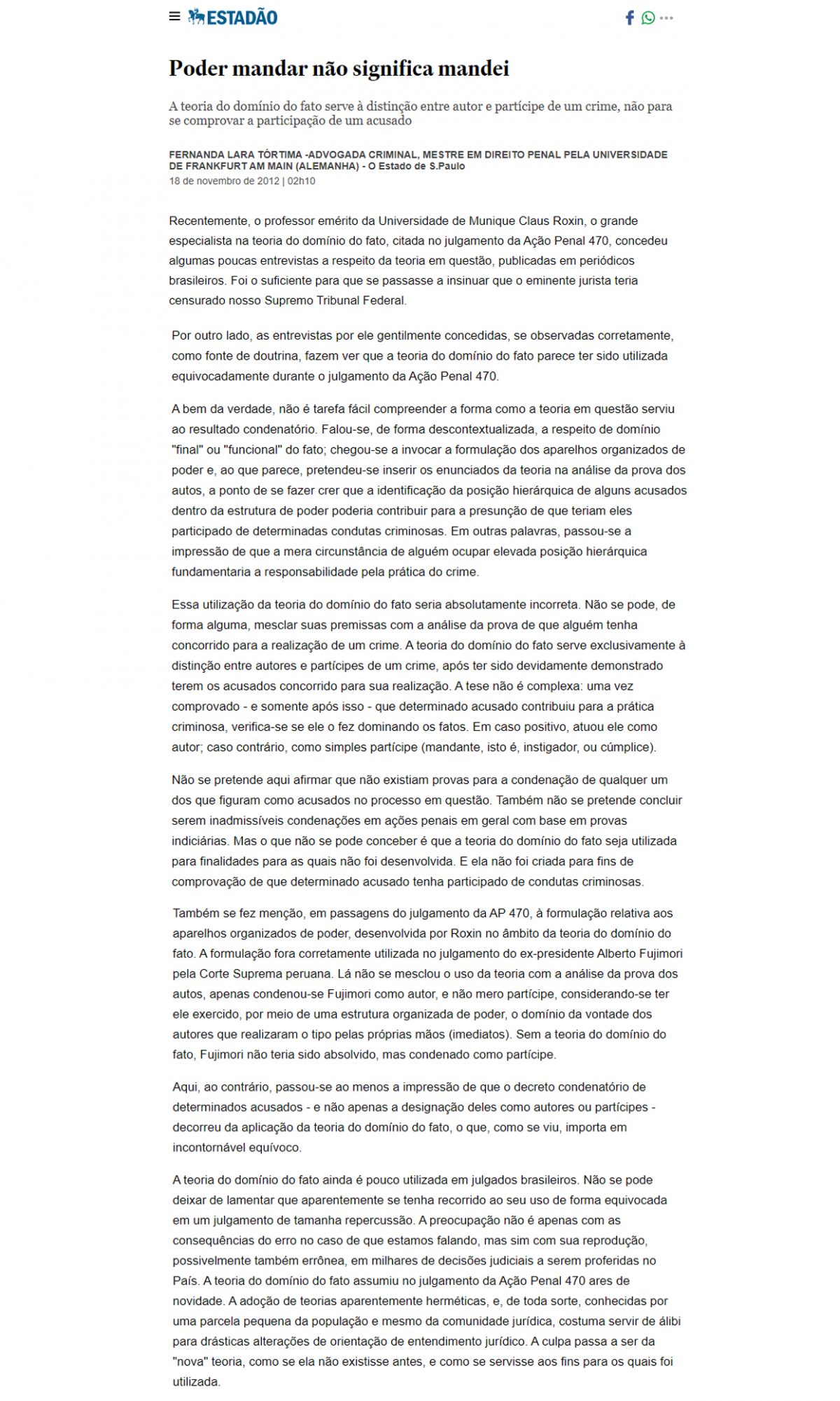Recently, Claus Roxin, the emeritus professor at the University of Munich and the foremost expert on the theory of control over the act, which was cited during the trial of Criminal Case 470, granted a few interviews on the topic to Brazilian publications. This was enough to spark suggestions that the eminent jurist had censured Brazil’s Supreme Federal Court.
Nothing could be further from the truth. To think that Roxin had directly criticized the opinions delivered during the aforementioned trial is, at best, naïve. To spread such an idea is reckless. It is evident that, despite his brief visit to Rio de Janeiro for an academic event at the end of October, he only had the opportunity to hear superficial explanations about the case. His statements were limited to an abstract restatement of ideas he has been publishing in scientific works for nearly five decades.
On the other hand, if correctly interpreted as a doctrinal source, the interviews he kindly gave demonstrate that the theory of control over the act seems to have been misapplied during the trial of Criminal Case 470.
In truth, understanding how this theory supported the convictions is no simple task. The trial mentioned “final” or “functional” control over the act out of context; references were made to the concept of organized structures of power, and it seems an attempt was made to incorporate the theory’s principles into the evidentiary analysis. This gave the impression that identifying some defendants’ hierarchical positions within a power structure could justify presuming their involvement in criminal acts. In other words, it seemed that merely holding a high-ranking position could substantiate culpability for a crime.
This use of the theory of control over the act is entirely incorrect. Under no circumstances can its premises be mixed with the analysis of evidence showing that someone contributed to committing a crime. The theory solely serves to distinguish between principal perpetrators and accomplices after it has been conclusively demonstrated that the accused participated in the crime. The concept is straightforward: once it is proven—only then—that a defendant contributed to the crime, it must be determined whether they acted by controlling the events. If so, they are the principal perpetrator; if not, they are merely an accomplice (instigator or aider and abettor).
This is not to claim that there was no evidence to convict any of the defendants in the case. Nor is it to suggest that convictions in criminal cases based on circumstantial evidence are inadmissible. However, it is inconceivable to use the theory of control over the act for purposes for which it was not developed. The theory was not designed to prove that a defendant participated in criminal acts.
References were also made during the trial of Criminal Case 470 to the concept of organized structures of power, developed by Roxin within the framework of the theory of control over the act. This concept was properly applied in the conviction of former president Alberto Fujimori by the Peruvian Supreme Court. In that case, the theory was not mixed with the evidentiary analysis; Fujimori was convicted as the principal perpetrator, not just an accomplice, for exercising control over the will of the immediate perpetrators through an organized power structure. Without the theory of control over the act, Fujimori would not have been acquitted but convicted as an accomplice.
In this case, however, it gave at least the impression that the conviction of certain defendants—not just their designation as principal perpetrators or accomplices—resulted from applying the theory of control over the act. As shown, this constitutes an undeniable mistake.
The theory of control over the act is still rarely used in Brazilian court decisions. It is regrettable that it seems to have been misapplied in such a high-profile trial. The concern lies not only with the consequences of this error in the case at hand but also with its potential reproduction—possibly in similarly mistaken ways—in thousands of future judicial decisions in the country. The theory of control over the act was treated during the trial of Criminal Case 470 as a novelty. The adoption of theories that appear hermetic and, in any case, are known only to a small portion of the population, including the legal community, often serves as a pretext for drastic shifts in legal interpretations. The blame is then placed on the “new” theory, as if it had not existed before and as if it were designed for the purposes to which it was applied.

